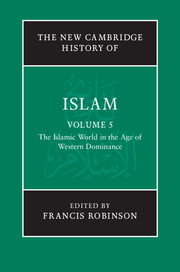Book contents
- Frontmatter
- Introduction
- PART I THE ONSET OF WESTERN DOMINATION C. 1800 TO C. 1919
- PART II INDEPENDENCE AND REVIVAL C. 1919 TO THE PRESENT
- 11 Turkey from the rise of Atatürk
- 12 West Asia from the First World War
- 13 Egypt from 1919
- 14 Sudan from 1919
- 15 North Africa from the First World War
- 16 Saudi Arabia, southern Arabia and the Gulf states from the First World War
- 17 Iran from 1919
- 18 Central Asia and the Caucasus from the First World War
- 19 Afghanistan from 1919
- 20 South Asia from 1919
- 21 South-East Asia from 1910
- 22 Africa south of the Sahara from the First World War
- 23 Islam in China from the First World War
- 24 Islam in the West
- Glossary
- Bibliography
- Index
- References
22 - Africa south of the Sahara from the First World War
from PART II - INDEPENDENCE AND REVIVAL C. 1919 TO THE PRESENT
Published online by Cambridge University Press: 28 March 2011
- Frontmatter
- Introduction
- PART I THE ONSET OF WESTERN DOMINATION C. 1800 TO C. 1919
- PART II INDEPENDENCE AND REVIVAL C. 1919 TO THE PRESENT
- 11 Turkey from the rise of Atatürk
- 12 West Asia from the First World War
- 13 Egypt from 1919
- 14 Sudan from 1919
- 15 North Africa from the First World War
- 16 Saudi Arabia, southern Arabia and the Gulf states from the First World War
- 17 Iran from 1919
- 18 Central Asia and the Caucasus from the First World War
- 19 Afghanistan from 1919
- 20 South Asia from 1919
- 21 South-East Asia from 1910
- 22 Africa south of the Sahara from the First World War
- 23 Islam in China from the First World War
- 24 Islam in the West
- Glossary
- Bibliography
- Index
- References
Summary
The twentieth century was decisive in making Islam the faith of significant numbers of Africans south of the Sahara (majorities in many areas and sizeable minorities in others). This upsurge in Muslim affiliation occurred at a time of Western domination: in the first half of the century European colonial regimes set the parameters for African political and economic change, and thereafter the structures and global relations they established influenced the trajectories of independent African states. This growth also took place at a time of global Muslim revival. Some credit European colonialism with facilitating Muslim expansion, and others highlight external Islamic influences, but local actors and circumstances influenced and complicated the processes of Muslim religious change. Colonial rule was uneven in its implementation, contradictory in its effects and contested by Africans: Muslims found gaps and operated in those spaces. Global Islamic discourses informed African Muslims, but the most successful leaders were those who expended their own intellectual effort and developed organisations that met specific local needs. Islam’s expansion was a result of indigenous initiatives in a context shaped by European colonialism and Islamic revival.
Twentieth-century expansion occurred after over a thousand years of Muslim presence in sub-Saharan Africa. Arabian, Indian Ocean and North African Muslims made initial contacts, but local converts and their descendants usually proselytised thereafter. In contrast with northern Africa, Arabic did not become a local language except in the Sudan; Africans maintained their own languages and identities as they became Muslim.
- Type
- Chapter
- Information
- The New Cambridge History of Islam , pp. 623 - 658Publisher: Cambridge University PressPrint publication year: 2010

